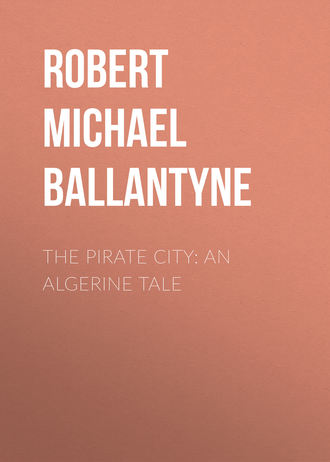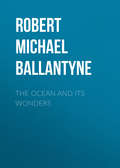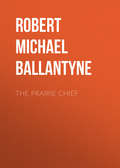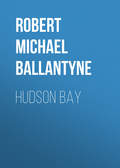
Robert Michael Ballantyne
The Pirate City: An Algerine Tale
Chapter Twenty One.
Social Intercourse in the Cavern
“Here you are,” cried the sympathetic Irishman, enlarging on the nature of the viands, as he spread them temptingly before the hungry men; “here’s food fit for a Dey, to say nothin’ of a month. Here’s a loaf—ain’t it?—about a fut an’ a half long an’ three inch thick. Coorious to look at, but a good un to eat I make no doubt—that’s a foundation for ’ee—there, cut ’im up an’ fire away; ye can’t listen properly to me discoorse till you git yer jaws to work. This here is a pie o’ some sort, I shud say, havin’ regard to the shape, only that ain’t the sort o’ wittles a Jew would send ’ee, is it? P’raps it’s wild-boar, for I’ve seed no end o’ them critters in the market. Maybe it’s lion, for they do says there’s lots o’ the king o’ beasts in the mountains hereabouts, though I can’t say I’ve heerd ’em roar yet. Hows’ever, wotever it is, here it is, so go ahead.—Hallo!” exclaimed Flaggan remonstratively, as he cast a glance at the sleeping man beside him, “you’ve begun without the ould man. Don’t ’ee think it ’ud be but filial-like to wake him up an’ start fair?”
“No, we’ll let him sleep on,” answered Lucien, as he began to eat with right good-will, in which he was ably seconded by his brother. “My father needs rest quite as much as food at present. He shall eat when he awakes.”
“Well, you knows best,” returned the seaman, taking out his pipe and tobacco-pouch; “it’s wan comfort anyhow that the wittles can’t get colder than they be now, and there’s overmuch for ’ee to ait the whole consarn at one bout, so the ould man’ll git his grub, though I must own it’d have liked to have seed ’im start fair.—Hand over the glim, plaise.”
Lucien passed the small lantern to Flaggan, whose hard good-humoured features were for a few seconds suffused with a ruddy glow as he put the light close to it, and drew the flame vigorously into the bowl of his very black little pipe. Then, setting it down beside him, he smoked in silence and in much satisfaction, as he contemplated the hearty manner in which the young men enjoyed their meal.
When he had finished, Lucien bowed his head for a few seconds in silent thanksgiving, and Mariano paused respectfully while he did so. Then, taking a long draught from the earthenware bottle; the elder brother expressed his gratitude to the Jew for the opportune relief.
“That seems to be good stuff to judge be the way ye smacked yer lips,” observed Ted, removing his pipe and wiping his mouth with the sleeve of his coat.
“Try it,” said Lucien, handing him the bottle with a smile.
“Got no smell,” remarked the tar, as he put the bottle to his mouth—“wather!” he added contemptuously, as he put it down and resumed the pipe.
“The best of drink for man and beast,” said Lucien, laughing.
“May be so,” returned Flaggan shortly, “but I ain’t used to it.”
“Is it long since you came to this country?” asked Lucien, while he and Mariano rolled up two of those neat little cigarettes with which the denizens of Algiers at the present day are wont frequently to solace themselves.
This question called forth from the seaman the greater part of his recent history, in return for which Lucien, drawing forward the hood of his burnous, and resting his elbows on his knees, briefly related that of himself and his kindred.
“But why are you staying here, since, being a British subject, you are free to go when you please?” asked Lucien.
“Bekaise,” answered Flaggan, “it ain’t every day that a British ship calls in at this piratical nest, and I’d raither go off in a man-o’-war if I could manage it. There’s a merchantman came into port yesterday, I’m towld, an’ the cownsl advised me to go away with it; but it seems the Turks have made some difficulty about her, so I’ll wait. I’m in no hurry. The Flaggans, as a race, have been noted since the time of Adam—if not earlier—for takin’ life aisy.”
“Then the Flaggans must be nearly related to the Arabs, for they take life easier than any race I ever met with,” said Lucien, laughing.
“I shud doubt that, ’cause they’re lazy, and we ain’t.—Talkin’ o’ that, sir,” said the seaman, as a sudden thought struck him, “I’m towld that you are learned in lingos an’ histories: could ye tell me who was the first people that got howld o’ this country? ’cause I’m coorious to know, having had a stiffish argiment on that pint with Rais Ali. He howlds that it was the Moors, an’ I’ve heerd say it was the Arabs.”
“You are both partly right,” replied Lucien; “for the Arabs were among the first conquerors of the land, but you are wrong in supposing Moors and Arabs to be altogether different races. When the Arabs came into the land some of them took to the plains inland, and continued their wild wandering idle style of life—half predatory, half pastoral; others took up their abode on the coast, became more mingled with the people of other sea-faring tribes, built towns, and came at last to be known as Mauri or Moors, from which the part of the land they dwelt in was known of old by the name of Mauritania.”
“But the aborigines,” continued Lucien—
“The abor-what? sir,” asked Flaggan, removing his pipe.
“The aborigines—the original inhabitants of the land—”
“Ah, I see, sir,” returned Ted; “them as was at the werry beginnin’, just arter Adam and Eve like; ’zactly so—fire away!”
“Well, I’m not quite sure,” replied Lucien, with a laugh, “that they came here immediately after the time of Adam, but at all events they came before the time of an authentic history, for our earliest historians record the fact that before any other nation invaded the northern shores of Africa, the country was in possession of a very warlike race, who, although overcome and driven from the plains by the more civilised and better-armed nations that successively attacked them, remained in the fastnesses of the Atlas Mountains absolutely unconquerable, and the descendants of these original inhabitants, known as Kabyles, remain a free and independent people at the present day, having successfully defied the might of Romans, Vandals, Arabs, and others, since the beginning of time.”1
“You don’t say so, sir,” remarked Flaggan, blowing a thin cloud of admiration into the air; “well, an’ how did things git along arter the abridginal inhabitants was fust druv back into the mountains?”
“They did not get along quite so quietly as might have been desired,” said Lucien.
“The early history of the northern shores of Africa, now known as Algeria,” he continued, “is involved in the mists of antiquity.”
“Arrah! now, don’t misremimber,” said Ted, with a quiet grin, “that I ain’t bin edicated quite up to that.”
“Well, the beginning of it all,” said Lucien, returning the grin with a smile, “is rather foggy.”
“Ah! that’s plain enough. Heave ahead, an’ whativer ye do, steer clear o’ jaw-breakers,” murmured the seaman.
“The region,” said Lucien, “was first known as Numidia and Mauritania; Numidia being so named by the Greeks, who styled its wandering tribes Nomads. They were pastoral in their habits and thievish in their propensities, without laws or government worthy of the name. The Mauri, or Moors, devoted themselves to more settled pursuits, became traders and inhabitants of towns, and were a mixed race, although originally springing from the same stock as the Nomads, or Arabs. These were the early inhabitants, who lived during the foggy period.
“The Medes, Armenians, and Persians afterwards founded a colony, and traded with the natives of the interior. Then the Phoenicians landed, and began to build towns, of which Carthage, founded B.C. 853, was the chief. The Punic wars followed; Carthage, the city of Dido, fell, and Mauritania was annexed to Rome. For hundreds of years after this the country was a scene of frequent and bloody warfare, in which many great historical names figured, and many great armies were swept away to gratify human pride, ambition, and cupidity on the one hand, and to defend hearth and home on the other, until the Roman power extended far and wide, from the Libyan desert to the Atlantic, and from the Mediterranean to the Zahara. Near the time of our Saviour, (B.C. 46), Sallust was established by Julius Caesar as governor of Numidia, where he collected materials for his history of the Jugurthine wars, and at the same time enriched himself by the plunder of the now highly civilised and prosperous country.”
“Trust ’em, they’re all sure to do that, the haythens!” said Ted, whose pipe, by its varying cloudlets, became a pretty fair index to his feelings.
“Roman remains are now to be found,” continued Lucien, “all over the land, even in the wildest regions of the Atlas Mountains, although the Romans utterly failed to subdue the hardy prehistoric natives of these mountains, who rose against them at frequent intervals, despite temporary defeats, and successfully defied all the various races who assailed them. During this Roman period the country was so well cultivated that it became, and was styled, ‘the granary of the Roman Empire.’ Christianity was also introduced, and became so wide-spread that at one time there were no fewer than a hundred and sixty bishoprics in northern Africa. Unquestionably there were then, as there always were and will be, some who were imbued with the peace-loving spirit of Christianity, including among them such men as Augustine, Tertullian, and Cyprian—whom, I dare say, Signor Flaggan, you never before heard of,—but it cannot be doubted that a vast majority possessed nothing of our religion but the name, for they constantly resorted to the most bitter warfare and violence to maintain their views.
“Towards the decline of the Roman Empire, Boniface, the proconsul, revolted against the Emperor Valentinian. The latter asked the aid of Genseric, king of the Vandals. Genseric most willingly agreed, went to Africa with 90,000 of his stalwart light-haired ‘barbarians’ of the north, was joined by the natives, and conquered the whole of Barbary, not for the Romans, but for himself! This was in the year 428, and the Vandals held the land for a hundred years.
“The Romans, in the year 533, again invaded northern Africa, re-took Carthage, and finally regained the country from the Vandals, but for only a short time, for the Moors constantly harassed them, until the land became desert in many places, owing to the decreasing population.
“Then came the followers of Mohammed, about the year 645, from across the Eastern deserts, enforcing religion by their favourite means, the sword; and in half a century they swept completely over the land to the Atlantic, causing the Crescent to supplant the Cross.
“But the Arabs did not stop here. About 711 they crossed over the sea, and carried the Crescent into Europe, under the bold and daring General Tarick, (Gebel-el-Tarick), from whom the spot where they landed came to be called Gibraltar. Hosts of Moors followed the Arab conquerors, and the Spaniards, confounding them, styled them all Moors.
“Barbary was for a long time after this under the rule of Emirs, appointed by the Caliphs; but they found little rest in Africa, for the Berbers and others harassed them continually.—It would weary you to go over the whole history of the wars and disputes which tore the wretched country to pieces during hundreds of years after this; but it may interest you to know that this city of Algiers was founded in the year 944 by Ziri, governor of Aschir, who established a hereditary throne for his race. But his dynasty came to an end in course of time, and so did that of others. Race rose against race, and tribe against tribe, conquering and re-conquering; only a few of the coast towns being able to maintain their position as independent powers, and supporting themselves by piracy.
“By degrees the pirates of the Barbary coast began to be very formidable and daring, insomuch that from time to time various nations sent expeditions against them, with more or less success, but without materially checking their depredations. They were greatly strengthened in numbers at the time of the expulsion of the Moors from Spain. An expedition was fitted out against them by Ferdinand in 1501, and in 1505 the Spaniards made themselves masters of some of the chief Barbary towns, including Algiers.
“About this time two famous pirates ravaged the coasts of the Mediterranean—the brothers Barbarossa, sons of a fisherman. They were ambitious scoundrels, and aimed at a throne. An opportunity ere long presented itself. The Algerines invited them, in 1510, to come and free them from the Spanish yoke. They went gladly, defeated the Spaniards, and then the elder Barbarossa proclaimed himself king, after beheading Hassan, another famous corsair, killing the king, and committing fearful excesses on the inhabitants. This villain was slain by the men of an expedition sent against the Algerines by Charles the Fifth, but the Turks made his brother Hayradin king in his stead. In 1518 Hayradin Barbarossa sought recognition by the Sultan of Turkey. He was made Pasha, and from that time till now Algiers has remained a nominal dependency of Turkey;—a pest to the civilised world, and a disgrace to humanity.”
“Well, now,” observed Ted Flaggan, knocking the ashes out of his pipe, and refilling it; “there are more surprisin’ things in the history of this here world than I was aware of. It’s my unwarnished opinion—”
The expression of the seaman’s opinion was here cut short by the sudden awakening of the elder Rimini, who immediately sat bolt upright and stared at the stranger with eyes like those of an owl in sunshine.
Lucien hastened to explain, and to spread the food sent by Bacri before his father.
Feeling sensations like those of a starved wolf, Francisco merely smiled, nodded, and shook hands with the sailor, and then, seizing the remains of the loaf and the pork,—“wild-boar,” or “lion,” pie, commenced with infinite gusto to his unexpected meal.
Chapter Twenty Two.
Shows how the Pirates were wont to treat Men of Note
When his hunger was appeased, Francisco Rimini turned to Ted Flaggan and asked him, through Lucien, to go over again in detail the course of action which Bacri advised him and his sons to adopt in order to effect their escape out of the country. “For,” said he with emphasis, “I’m neither a lion nor a rabbit, and cannot therefore make up my mind to spend the rest of my days in a hole.”
We will spare the reader Mister Flaggan’s repetition of the details referred to, merely remarking that they embraced careful directions as to when and where a boat would be found on the coast ready to carry them out to sea, and that they contained many earnest cautions to be wary, as nothing short of death by slow torture would be their fate if recaptured—this being their second attempt at escape.
Meanwhile circumstances were transpiring which gave a new turn to the state of affairs in the pirate city.
We have elsewhere remarked on the amazing fact that the great powers of Europe and America tolerated the system of barefaced piracy which was carried on by the Algerines against all nations that did not pay them “black-mail,” but it must not be supposed that this disgraceful submission was the result of fear or of indifference. The truth is, that the great powers were so busily engaged in throttling each other that they had no time to give proper attention to the Algerine wasps that stung them, and the wasps themselves were so besottedly ignorant of European affairs and of their own relative insignificance, so puffed up indeed by their supposed greatness—a delusion which was shamefully fostered by the action towards them of the great powers themselves—that they wilfully proceeded to extremities which a very little knowledge of other nations would have convinced them was the certain way to bring about their own ruin. The immense sums raised year after year by various European nations, and given to the pirates for the redemption of thousands of Christian slaves, proved that they were not indifferent to the scourge of the Mediterranean.1
But in the midst of this disgraceful forbearance of the nations, there was an occasional growl from one and another, and a fierce side-glance at the wasps, which might have let them see that their nest was in danger.
For instance, in 1804 Admiral Nelson menaced the town with a large fleet, and not long afterwards the Americans absolutely declined to pay their “black-mail,” and sent a squadron to procure, or, if need were, to compel a favourable treaty of peace with the Algerines. Other clouds arose here and there and overhung the doomed city, but the infatuated pirates remained blind as bats and insolent as monkeys.
Thus matters stood when the Dey Omar ascended the throne, and for some time afterwards.
One morning the English consul was summoned to attend the divan of the Dey, in connexion with a vessel which had lately been brought in as a prize by one of the Algerine corsairs.
The consul had previously presented himself at Court—as did all the other consuls—to pay his respects to the new Dey, and on a subsequent occasion had made an effort to press a point which had always been a matter of deep interest with him, namely, the bringing about of peace between the Algerines and the Portuguese. There were many Portuguese slaves in the town and neighbourhood at the time, and several officers of that country dwelt there, exempt from the duty of labouring like beasts of burden at the works on the walls and about the harbour, solely in virtue of annual tribute being paid by their friends. The former Dey, Achmet, had declined to oblige his friend Colonel Langley by making peace with Portugal, on the ground that he could not forego the advantages resulting from a state of warfare. The new Dey, Omar, was still less capable of being influenced by considerations of humanity.
“What would you have?” he said, when Colonel Langley spoke to him on the subject; “my people are brigands, and I am their chief! If I make peace with Portugal, it will be absolutely necessary that I should declare war with America, merely to keep my people employed!”
This was at all events candid, and the consul felt that it would be vain to press the matter he had so much at heart as long as Omar occupied the throne.
On his way down to the Marina, where the divan referred to was to be held, he met Blindi Bobi looking rather disconsolate. Having an hour or more to spare, he resolved to have a chat with him.
“Well, Bobby, my boy,” said the consul kindly, for the eccentric interpreter was a favourite, “you seem sad. Nothing wrong, I hope?”
“Not wi’ me, nohow,” responded Bobi, shaking his head. “Nuffin never wrong wi’ me. Always too well. Health to the mast-head—more nor I knows wat to do wid. Wishes I could die, I do—sometimes.”
“I grieve to hear that,” said the consul earnestly, for he saw that the man was in no jesting humour. “Let me know what distresses you.”
“Sidi Cadua,” said Bobi.
“What! the father of poor Ashweesha, widow of my late friend Achmet Dey?” said the consul.
“Yis. Hush! Omar Dey—de divl,” growled Bobi in a low tones, “gits the berry stones to listen an’ reports wat peepil say.”
“Never fear,” returned the consul, smiling, “they dare not report what I say. Come, tell me about it.”
“Oh! it shockable,” said Bobi. “Come an’ see.” So saying, the poor man hurried off in the direction of a low-lying part of the town, closely followed by the consul. Here, seated on a plain mat in an empty cellar, which was destitute of furniture and almost of light, they found the father of the late Sultana. His gentle, kindly spirit seemed, like his frail old body, to be bowed to the very dust.
“My dear friend,” exclaimed the consul, almost overwhelmed with grief at the sight, “has the villain robbed you of all your wealth?”
“He has,” replied the old man, taking the consul’s proffered hand and pressing it warmly; “but he has done worse than that—”
“What! has he dared to—”
Sidi Cadua interrupted and answered the question by quietly removing the lower part of his robe, and exposing his feet, which were dreadfully swollen and scarred with the bastinado.
“Even that is not the worst of it,” said the old man, re-covering his mutilated feet; “my daughter, my sweet, tender Ashweesha, has been cruelly bastinadoed for—”
He broke down here, and, covering his face with his withered hands, groaned aloud.
For a few moments Colonel Langley could not speak.
“But why,” he said at length, “why such cruelty?”
Recovering himself, Sidi Cadua slowly related the circumstances. An enemy, he said, had accused him to the Dey Omar of having hidden away a large amount of treasure, and he had been put to the torture in order to force him to disclose the truth; but the truth was that he had never concealed treasure, and had no confession to make. Believing that his silence was the result of sheer obstinacy, and that the truth might perhaps be extorted from his daughter, the cruel monster had the gentle Ashweesha dragged from her apartments and subjected to the bastinado.
“Dreadful!” exclaimed the consul. “Where is she now?”
Sidi Cadua silently pointed to a ragged old burnous in a dark corner of the little cellar, under which a human form lay crouched up and motionless.
“Not dead?” asked the consul anxiously.
“No, not dead,” replied the old man, with an upward glance of gratitude.
“Sidi Cadua,” exclaimed the consul, rising hastily, “excuse my leaving you now. I have to attend the divan. You shall hear from me soon. You—you,”—looking round—“have no other house than this—no food?”
“Nothing!” said the old man in a low voice, as his white head sank on his bosom.
“Listen, my man,” said the consul earnestly, as he hastened down to the Marina.
“Yis, Signor,” answered Bobi.
“Can you find time to go out to my house just now?”
“Yis, Signor.”
“Then, go—go as fast as legs or horse can carry you. See my wife; tell her what we have seen; let her send Rais Ali into town with other servants—separately, not to attract attention—with baskets—full baskets, you understand?”
“Yis, Signor, full to bustin’,” answered Bobi, with glittering eyes.
“Full as they can hold of all that is needful—she will understand that.—There, be off—lose no time,” said the consul, thrusting a quantity of silver into the man’s hand.
“Kurnul Langley,” said Bobi, with enthusiasm glowing in his solitary eye, as he turned to go; “you—by the beard of the Prophet!—you’re the ace of trumps!”
With this strong, if not elegant expression of his sentiments, the sympathetic Bobi hurried away, and Colonel Langley entered the divan, where were assembled the Dey and the chief officers of state.
The discussion on that occasion was conducted warmly, for the pirates believed that they had made a good and legitimate prize in the shape of a Greek vessel, which was owned by a Mr and Mrs de Lisle, who, with their little son, were also captured.
Colonel Langley claimed these as British subjects, and the vessel as British property.
In this case the pirates had taken a precaution which, they had hoped, would save them all trouble. On boarding the vessel they had demanded all Mr de Lisle’s papers and passports, which, when delivered up, were torn into atoms and thrown into the sea. Thus they sought to destroy all evidence of the nature of the prize.
Mr de Lisle was a native of Guernsey, and therefore an English subject. Early in life he had entered a commercial house in Holland, and been naturalised there. Afterwards he was sent to a branch of the same house in Naples, which at that time was occupied by the French. Amassing considerable property, he resolved to return to his native land, and hired a Greek vessel, as being a neutral one, to convey him. On his way, he fell into the hands of the Algerines.
At the divan the British consul claimed that Mr de Lisle and his family and property should be delivered up to him.
The Turks, with whom Colonel Langley was out of favour now that his friend Achmet was dead, were furious. How could he be an Englishman, they said, when it was well-known that the French would not have permitted one of their chief enemies to remain at Naples?
“And besides,” added Omar, with a touch of sarcasm, “where are his papers to prove that what he says is true?”
The consul had made his demand with unusual firmness and dignity, for the memory of poor Sidi Cadua was strong upon him, but this latter remark somewhat perplexed him. Fortunately, at the moment, de Lisle himself, who was present, started up and said in English, across the divan—
“If I am permitted to go on board my vessel, I can still bring satisfactory evidence of my nationality.”
The Turks were extremely unwilling to concede this, but when the consul turned and said to the Dey, “I trust your highness will not refuse so reasonable a request,” he was permitted to go. In a short time he returned with the certificate of his marriage, which proved that he had been married in Guernsey, and was a British subject, to the inexpressible rage of the divan, who were compelled, however, to give in.
“Nevertheless, Monsieur le Console,” said the Dey sternly, “if it shall be proved, even twenty years hence, that you were wrong in this matter, you shall have to answer for it.”
From that time the British consul and the Dey became open enemies, which was a matter of gratulation to the consuls of some of the other powers, who had been rather jealous of Colonel Langley’s influence with the late Dey, Achmet.
Not long afterwards they would have been glad if his influence could have been restored; for Omar, being soured by what had occurred at the divan, as well as by many other things that crossed his imperious will, commenced to act in such an outrageous manner that the various consuls felt not only their independence but their lives in jeopardy.
Sending for the Danish consul one morning, Omar told that unfortunate man that his government had already been warned more than once to pay the tribute which was past due, and that he was going to stand their neglect no longer. He therefore ordered him to be put in chains, and sent forthwith to work in the stone-quarries.
The order was at once obeyed. A chaouse, at a signal from the Dey, seized the Danish consul by the waist-band, thrust him out of the palace, and along the streets to the Bagnio, there loaded him with chains, and led him forth to work with the slaves!
The consternation of the other consuls was of course extreme. The instant Colonel Langley heard of it, he ordered his horse and galloped into town, accompanied by Rais Ali and Ted Flaggan, the latter having constituted himself a sort of extra aide-de-camp or special attendant of the consul, in order to gratify the more easily an insatiable thirst for knowledge as to all that took place around him.
They went direct to the residence of the Danish consul, where they found his poor wife and children in the deepest grief and alarm at what had occurred, for it had been reported to them that Omar had said he would order the wife and children of the Danish consul to be put up for sale in the public slave-market if the tribute due by Denmark were not paid without further delay.
“Trust me, madam,” said the Colonel with indignation, “we shall not suffer this barbarian to carry out his threats, and we will, moreover, see instant justice done to your husband.”
Hastily writing several notes requesting a meeting with his brother consuls in the residence of the Dane, he despatched them by his two satellites, and very speedily the whole were assembled.
“Gentlemen,” said Colonel Langley, after some conversation, “it is imperative that we should act at once, unitedly and with decision. Anything like vacillation at such a crisis will encourage these barbarians to proceed to extremities which may end in our ruin. Need I call to your remembrance the recent case of the unhappy Dutch consul, who had dwelt twenty-three years in this city, and who, although an old and infirm man, was loaded with irons of sixty pounds’ weight, and marched out to labour with the other slaves, from which treatment he soon after died—all, forsooth, because his government had delayed to send the accustomed annual ‘present’ to the Dey at the appointed time? It concerns us all, gentlemen, that we should act promptly. We must proceed in a body at once—within this hour—to the palace, and demand that our brother consul shall instantly be set at liberty. For this purpose, if you agree with me, we must elect one of our number to be spokesman.”
At this point the other consuls interrupted the Colonel, by begging him to accept the office, and to lead them out at once.
“I accept it with pleasure,” said the Colonel, turning to Rais Ali, who stood at his elbow.—“Rais, you will accompany me to interpret—”
“Oh, Monsieur!” exclaimed Rais, who had not many minutes before been boasting to his friend Flaggan that he was a brave English tar as good as himself, but who now turned very pale; “oh no, no! Please, Monsieur, demand me not to go dis time for interprit. For certain the Dey hims kill me—hims kill all of us.”
“Well then, Rais,” replied the Colonel, somewhat amused at the man’s undisguised terror, “we shall all die together, and you will at least have the comfort of falling in goodly company.”
“But, master,” supplicated Rais, “I’s not a Turk; me dare not defy the Dey to hims visage. I’s only a craulie!”
By which the unhappy man meant to explain that he was only the son of a Turk by an Algerine mother, and that as such he could expect no mercy if he aided in bearding the Dey in his den; but the Colonel was inexorable, and poor Rais Ali was obliged to submit.
At this time, the English and French being at war, there existed a somewhat natural feeling of estrangement between the representatives of the two nations at Algiers. Colonel Langley thought the present a good opportunity to effect a better understanding between them. He therefore offered his arm to the French consul, who accepted it politely, though with feelings of surprise. Thus they walked out two and two into the street, and marched down the principal thoroughfare, across the great square, and straight into the palace.







